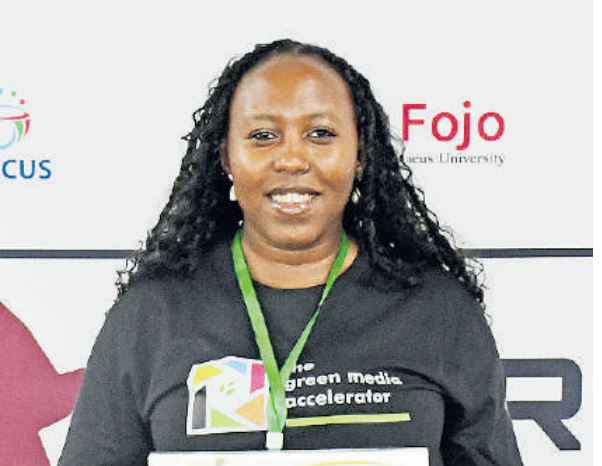
Itumbi criticises arrest of filmmakers
“It is unnecessary to arrest filmmakers merely for making a film"
Film, she believes, can be a mirror and a hammer, both reflecting what happening and smash silence surrounding climate change issues
In Summary

Audio By Vocalize

Sally Ngoiri was born a storyteller. She loved, from a young age, using the power she had to amplify community voices.
It was this love that she carried into adulthood, so that when she walks through Nairobi’s overflowing dumpsites or into makeshift recycling yards tucked behind city estates, she doesn’t just see trash, she sees stories waiting to be told.
Stories of survival, innovation, injustice, displacement, resilience and hope. While others turn away from the mess, Ngoiri picks up her camera, determined to be the voice that spotlights any kind of story that emerges.
Film, she believes, can be a mirror and a hammer. It can reflect what is happening and smash silence around climate change issues.
However, she did not want to write the stories alone. She began a mentorship programme, Kick Ass Films, which mentors women aged from 15 to 25 on using film for change.
She focuses on Nairobi women whom she invites into the fellowship that tells stories, especially in informal settlements.
“I am a product of scholarships, having attended many international universities, thanks to people who believe in my craft,” Ngoiri told the Star.
“I want to extend possibilities to someone else and this production helps me do it,” she says.
This conviction led her to the Green Media Accelerator (GMA) Bootcamp, an initiative that supports African filmmakers telling urgent environmental stories.
It was developed by three organisations in Africa: Wits Centre for Journalism, the Fojo Institute and Magamba network, through the Consortium for Human Rights and Media (Charm).
It seeks to empower five media actors across Sub-Saharan Africa to better tell climate-change stories through mentorship and grants. For Ngoiri, the bootcamp felt like stepping into a space that finally spoke her language.
“This was the opportunity I’d been waiting for. To tell stories that don’t just entertain but also push people to think and act, especially on something as urgent as our planet,” she said.
Through her company, Kick Ass Films, Ngoiri entered the GMA competition with a bold idea: investigate Kenya’s waste management systems.
Her project aims to uncover how waste is handled, whether companies are truly recycling, as they claim and what policies govern these systems.
She seeks to unpack recycling, which has become a buzzword and check whether it is working or if it is just another corporate greenwashing tactic.
An upcoming documentary celebrates local innovation. Ngoiri shines light on ordinary citizens using creativity to tackle environmental issues at the grassroots.
“We are featuring a fashion designer who creates runway pieces entirely out of trash. That’s the kind of brilliance I want to spotlight,” she says.
“It’s not just about pointing out what’s wrong. It’s about showing what’s possible.”
Beyond her GMA project, Ngoiri is already carving out a name for herself in environmental storytelling.
Her feature film, The Greenhouse, currently streaming on Showmax, follows a family’s fight to protect forest land in Kenya.
She is also developing two other films: Waste Land, which explores the systemic failures in urban waste management and Wild at Heart, a virtual reality (VR) experience that takes viewers deep into the ethical dilemmas of wildlife rehabilitation.
“Waste Land follows Janet Chemitei, a bold fashion entrepreneur in Eldoret who transforms discarded clothes into high-fashion pieces and a local innovator turning plastic waste into durable building bricks.
As Janet reclaims dumped fast fashion to tell stories of identity and resistance, her counterpart reimagines plastic pollution as the foundation for a more sustainable future.
Together, their journeys reveal a powerful narrative of creativity, resilience and a circular economy where what is thrown away is not the end, but the beginning of something beautiful and enduring,” Ngoiri says.
“With Wild at Heart, I wanted people to experience the fragility of nature up close,” she says. “VR lets you stand in the animal’s world — and feel their fear, their beauty, their struggle.”
Through the Green Media Accelerator, Ngoiri aims to strengthen her storytelling network with like-minded creators and push boundaries on how Africa’s environmental stories are told.
“I want to build stories that create impact. Stories that move from the screen into policy, from entertainment into action,” she says.
As the world grapples with the effects of climate change, Ngoiri believes filmmakers like herself have a unique role in putting faces, voices and context to what is often seen as a distant, technical issue.
“Climate action doesn’t start in boardrooms, it starts with the stories we choose to tell,” she says.
And if Ngoiri has anything to do with it, those stories will be bold, beautiful and impossible to ignore.

“It is unnecessary to arrest filmmakers merely for making a film"